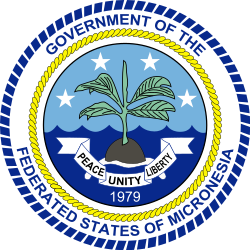A request that this article title be changed to 2025 Micronesian general election is under discussion . Please do not move this article until the discussion is closed. |
| |||||||||||||
10 of the 14 seats in Congress | |||||||||||||
|---|---|---|---|---|---|---|---|---|---|---|---|---|---|
| |||||||||||||
 Popular vote share of elected members by electoral district | |||||||||||||
 |
|---|
Parliamentary elections were held in the Federated States of Micronesia on 4 March 2025 to elect ten of the fourteen seats of the Congress of Micronesia for a two-year term. [1] [2] There are no political parties and all candidates stood as independents.